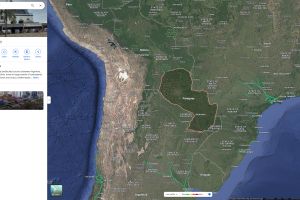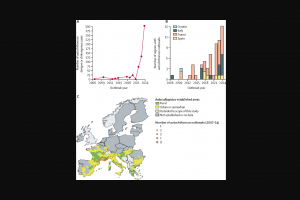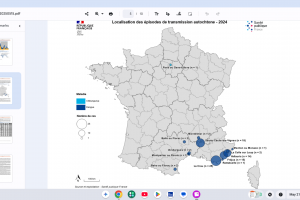Florida Travel Vaccines
Florida Travel Vaccines May 2025
The Florida Department of Health (FDH) updated its Vaccine-Preventable Diseases Surveillance Report in 2025, stating that although vaccinated individuals can still contract diseases, in general, those who have been immunized tend to have less severe outcomes than those who have never been vaccinated. FDH published its Arbovirus Surveillance update #17 on April 26, 2025, disclosing mosquito-borne diseases, including Eastern equine encephalitis, Japanese encephalitis, Chikungunya, Dengue, Malaria, California encephalitis group viruses (CEV), Yellow fever, West Nile virus, and Rift Valley fever.
Florida Mosquito Advisories
In Florida, 14 species of Anopheles mosquitoes have been identified as vectors of infectious diseases that transmit to humans. As of May 2025, Miami-Dade County remains under a mosquito-borne illness alert scheduled to expire in December 2025.
Florida Travel Vaccination Requirements
As of 2025, the U.S. Centers for Disease Control and Prevention (CDC), Canada Health, and the United Kingdom have not issued vaccination requirements for visiting Florida, and the U.S. Department of State and the U.S. Transportation Security Administration (TSA) have not issued safety advisories for traveling to Florida in 2025.
Florida Vaccine-Preventable Disease Outbreaks
Chikungunya—As of May 2025, a traveler from Indonesia was confirmed with chikungunya in Broward County. Eleven instances of chikungunya onset in 2024 have been reported in individuals with a travel history to Brazil (five), India (five), and Pakistan. Florida counties reporting chikungunya cases were Broward, Manatee, Miami-Dade, Orange, Pinellas, and Hillsborough. Four travel-related Chikungunya cases were reported in 2023, and one case was reported in 2022. Florida providers have limited access to Chikungunya virus diagnosis tests, which are often mistaken for Dengue. However, Chikungunya vaccines are offered in Florida.
Dengue Fever - In 2025, sixty-four cases of dengue fever were reported among individuals who had traveled internationally, and one locally acquired dengue case (DEN-3) was reported in Miami-Dade County. As of December 2024, 1,016 travel-associated dengue cases had been reported, primarily among travelers from Brazil, Cuba (567), and Puerto Rico. In 2024, 91 locally acquired dengue cases were reported from ten counties (Miami-Dade (50), Hillsborough (Tampa), Manatee, Monroe, Orange, Pasco (13), and Broward. Most dengue cases are serotyped as DENV-3 (396) and DENV-4. In 2023, 609 travel-associated dengue cases were reported, and 186 people contracted Dengue while in Florida.
Leprosy - Florida reports the most cases of leprosy (Hansen's disease) in the U.S., with the majority typically occurring in Brevard County, which accounted for 13% of the nation's 159 leprosy cases in 2020. There are no U.S. FDA vaccines for leprosy. However, BCG vaccination offers some protection against the disease.
Malaria - As of May, ten travel-related malaria cases have been confirmed in Florida in 2025. In 2024, 72 cases of travel-related malaria were reported in individuals with a history of visiting malaria-endemic areas, such as Africa (Nigeria) and Central and South America. In 2023, seven locally acquired malaria cases were reported near Sarasota, along with 78 malaria cases related to travel. The U.S. CDC published a report on September 8, 2023, Outbreak of Locally Acquired Mosquito-Transmitted Malaria.
Measles - The Florida Department of Health in Broward County confirmed about ten measles cases in early 2024.
Mpox - Since the beginning of 2024, Florida has identified 184 cases of mpox across 12 counties. In 2023, the CDC reported 75 clade II mpox cases in Florida.
Oropouche Fever—As of December 2024, 103 cases of Oropouche fever were reported in individuals who had traveled to an endemic area such as Cuba. The Florida counties reporting cases were Broward, Duval, Hillsborough, Lee, Miami-Dade (61), Orange, Palm Beach, Pasco, Polk, and Sarasota.
Rabies - The Florida Department of Health in Miami-Dade County issued a rabies alert in response to a confirmed case of rabies in a horse tested on March 26, 2025.
Respiratory Syncytial Virus - The Florida Department of Health segments RSV reports into five regions. As of October 2024, RSV activity and hospitalizations had increased throughout Florida, and there was one outbreak in Miami-Dade County.
Vibrio vulnificus - Florida reported 83 cases (18 in Pinellas County) and 18 fatalities in 2024. In 2022, 74 cases and 17 deaths were confirmed in Florida. Vibrio vulnificus is a naturally occurring bacterium found in warm, brackish seawater.
West Nile Virus - In 2024, eighteen human cases of West Nile virus (WNV) illness were reported in Florida. Seven positive samples were confirmed from seven humans in 2023. Six WNV-positive samples were collected from six humans in 2022. Ten human cases of WNV were reported in Florida in 2021.
Zika Fever - In 2025 and 2024, no cases of Zika fever were reported. Zika continues to be detected off Florida's east coast, in Puerto Rico, and in other locations throughout the Americas, including Costa Rica.
Disease-Spreading Mosquito Prevention in Florida
The Florida Keys Mosquito Control-Oxitec Mosquito Project began in April 2021. It releases and evaluates the effectiveness of Oxitec's Friendly™ Aedes aegypti mosquitoes as disease-carrying vectors. In the three pilot seasons, the Florida Keys Mosquito Control District and Oxitec have demonstrated that Oxitec's non-biting, male Aedes aegypti mosquitoes can reduce the local abundance of the invasive Aedes aegypti mosquito, reducing the risk of dengue and malaria infection. These male mosquito releases followed the U.S. Environmental Protection Agency's approval in March 2022.





